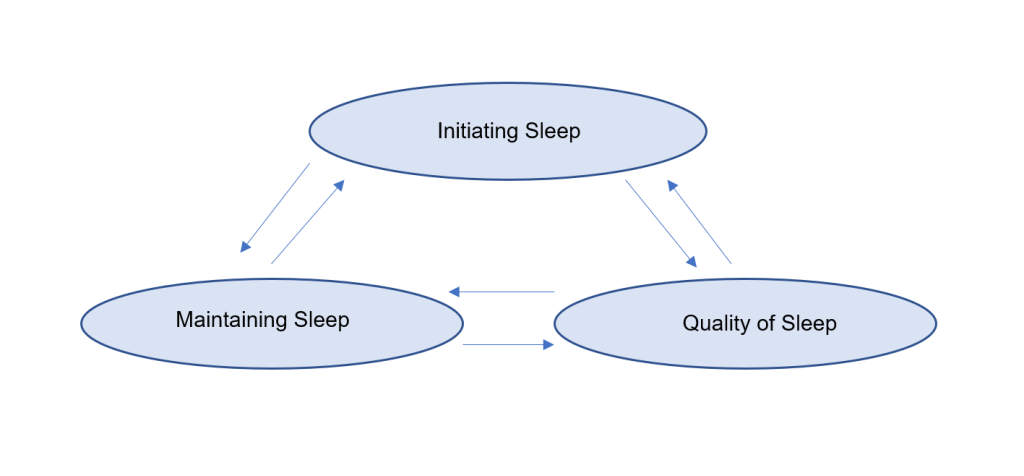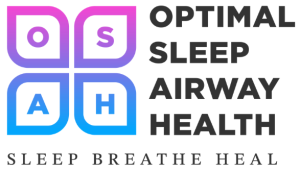Sleep and Wellbeing

Sleep, and more to the point an adequate amount of good quality sleep, is vital to an individual’s health and wellbeing. Sleep gives the body time to recuperate, repair and detoxify. It also gives the brain a chance to process the activities of the day and plays a role in memory formation.
Identifying the Sleep Problem
Three Main Questions
1. Do you have problems going to sleep? – Initiating Sleep
2. Do you have problems staying asleep? – Maintaining Sleep
3. Do you feel refreshed when you wake up? – Quality of Sleep

Problems initiating sleep can lead to problems in maintenance of sleep and therefore a decrease in sleep quality. These three areas can all affect each other, and there are many underlying factors that can contribute to quality of sleep.
Initiating Sleep
Generally, it should take between 10-15 minutes to fall asleep. If patients take longer than this to fall asleep the following considerations should be investigated.

Nutritional Support for Initiating Sleep
Product | Nutrient | Action | Dose |
Sleep and Detox Nutrients | Hops | Hypnotic | 1 serve per day |
Glutamine, Vitamin B6 | Precursor nutrients for GABA production, inhibitory neurotransmitter | ||
Taurine | Supports inhibitory neurotransmission | ||
Bicarbonate | Sleep requires an alkaline environment, may reduce excess acid and assist cellular oxygenation |
Additional Supplements to Consider
Timing | Supplement | Action | Dose |
Evening | Adenosine | Inhibitory neurotransmitter – increases the urge to sleep. Regulates cellular metabolism. Neuroprotective. | 1 tablet, 1 hour before bed, increase as needed. |
5-HTP or tryptophan | Provides precursor nutrients for melatonin production | 1 capsule 1 hour before bed. |
Sleep Maintenance and Quality
There are a number of biochemical imbalances and conditions that may affect the maintenance of sleep, causing the patient to wake frequently during the night.
Sleep is necessary for detoxification, tissue repair, regeneration and most importantly for recuperation of the brain from the day’s activities. Stage 1 sleep is particularly associated with immune activity and repair mechanisms, while stage 2 sleep is associated with memory development and cognitive function.
Investigate the following underlying causes and contributing factors and refer to individual protocols for supplementation strategies to support these. Other factors that may need to be considered include insulin resistance and/or irregular blood sugar control, hypoxia and vestibular imbalances.

Inflammation
Inflammation and pro-inflammatory cytokines have been associated with disturbed sleep. Therefore, investigating and correcting underlying inflammation may lead to improved maintenance of sleep, due to reduction of activity of pro-inflammatory cytokines.
Mouth breathing can cause inflammation of the tongue, increasing the release of pro-inflammatory cytokines. Vibration of the soft tissues in the throat is due to a narrowed airway and adds to the inflammation. Hypoxia as the result of restricted air flow ultimately increases oxidative stress contributing to systemic inflammation.
Nutritional Support for Inflammation
Product | Nutrient | Action | Dose |
Sleep and Detox Nutrients | Quercetin | Quercetin down-regulates inflammation through the inhibition of mast cells and inflammatory mediators such as IL-6 and TNF-alpha | 1 serve per day |
Turmeric | Curcumoids found in turmeric inhibit the 5-lipoxygenase pathways | ||
Glycine | Glycine may suppress inflammatory cells such as macrophages to suppress inflammatory cytokine production | ||
Vitamin C | Vitamin C is a powerful antioxidant that may protect against excess free radical production associated with inflammation |
Liver Function
Optimal liver function is important for sleep and sleep is important for detoxification, a major function of the liver. The liver plays a central role in may metabolic pathways, so any general interference with liver function can have extremely diverse effects. For example, impaired liver function may lead to problems in uric acid metabolism, and hence to gout or difficulties in maintaining circulation, to problems in protein synthesis, growth and development and even kidney function.
Functions of the liver:
- Regulates carbohydrate metabolism
- Has storage functions
- Regulates protein metabolism
- Detoxifies many toxic substances
Liver function is very important – a healthy liver plays a role in maintaining a healthy weight as it is the organ in the body that detoxifies the blood stream.
Phase 1 Detoxification
The phase 1 pathway of detoxification involves a group of enzymes collectively called Cytochrome P450. During phase 1, toxins are broken down usually by oxidation, reduction and hydrolysis. This can either transform the toxin into a water-soluble form which allows excretion by the kidneys or converts it to a more chemically active form to be metabolised further by phase 2.
Phase 1 detoxification results in the production of free radicals as the toxins are transformed. Without sufficient antioxidant protection, these free radicals can damage the liver and other body tissues.
Phase 1 also must be balanced by phase 2, to finish the detoxification process and if phase 2 detoxification is not working efficiently, toxic intermediates can build up in the body causing damage.
Nutritional Support for Phase 1 Liver Detoxification
Product | Nutrients | Action | Dose |
Sleep and Detox Nutrients | Niacin, riboflavin, zinc, magnesium, thiamine, quercetin, folic acid, vitamin B6, Vitamin C, high protein diet, leucine, isoleucine and valine | Regulate phase 1 activity. B Vitamins are co-factors for enzymes involved in Phase I detox activities. | 1 serve per day |
Cysteine, glycine, glutamine, vitamin C | Precursor nutrients for glutathione production; counteracts free radicals produced through phase 1 detox. | ||
Vitamin A, vitamin E, zinc, selenium, magnesium, manganese, quercetin | Antioxidant nutrients to counteract and neutralise free radicals produced from phase I detox |
Phase 2 Detoxification
There are differing pathways in phase 2 liver detoxification. Certain toxins are bound (conjugated) by different substances to be excreted. A few of these pathways are briefly explained below.
Glucuronidation
In the process of glucuronidation, glucuronic acid is added to toxic compounds. Oestrogens are bound this way, as are many drugs, such as steroids, morphine, diazepam, aspirin and salicylates. These substances are then excreted in either urine or bile. A yellow sclera (the white of the eye) and jaundice are signs of decreased glucuronidation.
Sulphation
Sulphation is the major pathway for detoxification of amine neurotransmitters and steroid hormones including testosterone and thyroid hormone. It also binds substances such as preservatives and artificial food colourings. These substances are converted into soluble forms to be excreted in the urine or bile.
This pathway requires sulphur containing compounds to act as sulphur donors for the process. These usually include the amino acids cysteine, N-acetylcysteine, methionine and taurine.
Glutathionation
This is the process of glutathione conjugation, which binds toxins such as heavy metals, pesticides and solvents, to be excreted in the urine or bile. High levels of exposure to toxins, therefore depletes glutathione quickly leading to increased susceptibility to diseases such as chronic fatigue syndrome.
Drugs detoxified by this process include paracetamol, certain substances in cigarette smoke, antibiotics, some insecticides and the heavy metals mercury, cadmium and lead.
Glycination
Glycination is involved in the metabolism of salicylic acids and benzoic acids for elimination. Glycine is the most important amino acid for this process.
Acetylation
Acetylation involves the conjugation of substrates with acetyl CoA. This substance is produced within the body and is also involved with other aspects of metabolism including the Krebs cycle.
Methylation
Methylation involves conjugation of a substrate with a methyl group. Methionine is the chief methyl donor. Methionine and cofactors such as choline, vitamin B12 and folic acid are involved in the synthesis of SAMe (s-adenosylmethionine). SAMe dependent enzymes catalyse methylation reactions. It may be possible to measure serum homocysteine, vitamin B12 and folic acid levels to determine methylation reactions. High homocysteine, lower B12 and folic acid may indicate a decrease in methylation capacity. This is often the pathway most often disturbed in chemically sensitive patients.
Testing
Functional Liver Detoxification Profile
Nutritional Support for Phase II Liver Detoxification
Product | Nutrients | Action | Dose |
Sleep and Detox Nutrients | Calcium-d-glucarate, magnesium | Supports glucuronidation pathway | 1 serve per day |
Glycine, glutamine | Supports glycination pathway | ||
Cysteine, glutamine, glycine, selenium, vitamin B6, B12, folate, rosemary | Supports glutathionation pathway and glutathione production | ||
Cysteine, carnitine, pantothenic acid | Supports acetylation pathway | ||
Cysteine, taurine, vitamin A, adequate protein | Supports sulphation pathway | ||
Betaine (TMG), vitamins B12, B6, folic acid | Supports methylation pathway |
Additional Supplements to Consider
Product | Nutrients | Action |
LMII | Methionine, taurine, choline, vitamins B12, folic acid, B6, magnesium, glutamic acid | Supports phase II pathways including methylation and sulphation |
Detoxification Nutrients | Glutamine, cysteine, broccoli sprout extract, garlic, vitamin C, selenium, zinc, pine bark extract, grape seed extract | Supports phase II pathways including glutathionation; provides antioxidant support. |
Gut Function
It is important to provide nutritional, repairing and healing support for the gastrointestinal tract, whilst also supporting the removal of pathogens and allergens and replenishing beneficial gastrointestinal bacteria when improving the body’s detoxification capacity.
Dietary Guidelines
- Abstain from foods suspected of allergenic or sensitive to
- Maintain an adequate protein intake and chew food thoroughly
- Maintain adequate water intake (at least 2 litres per day)
- Decrease tea, coffee and alcohol consumption
- Eat plenty of fresh fruit and vegetables (those indicated by the dietary recommendations)
- Avoid sugar and refined carbohydrate consumption and artificial sweeteners
- Do not overeat, as this places extra stress on the digestive system
- Eat 5 to 6 small meals per day to maintain blood sugar stability.
Nutritional Support for Gastro-Intestinal Health
Product | Nutrient | Action | Dose |
Sleep and Detox Nutrients | Quercetin, Vitamin A | Down-regulates inflammation, promotes repair of GI tract | 1 serve per day |
Vitamin A, zinc, glutamine | Promotes repair of the GI tract; promotes healthy mucosal lining and immune support; nutrients for gut energy and GAG barrier function | ||
Bicarbonate | Maintains and alkaline environment for intestinal health |
Additional Supplements to Consider
Product | Nutrients | Action | Dose |
Intestaclear | Garlic, Pau d’arco, Wormwood, black walnut | Anti-microbial formula to clear pathogens, assist in the reduction of detrimental bacterial overgrowth | 1-3 caps per day |
Hydrozyme | Betaine HCl, Pepsin | Support gastric acidity and stimulate protein digestion | 1-2 tablets before each meal |
DEF | Amylase, Lipase, Trypsin, Protease, Bromelain | Enzymes for digestive and absorptive support | 1-2 tablets after each meal |
Multiflora | Beneficial probiotic bacteria | Provides support for the beneficial bacteria in the gut; immune support; inhibition of detrimental organisms; digestive support | 1-2 caps per day |
Add Your Heading Text Here
The kidneys act as filters removing organic waste products from the blood and excreting them from the body along with excess salt and water. As an organ of excretion, the kidneys can be considered as part of the detoxification pathways of the body. Their efficient functioning is therefore important in maintaining optimal detoxification and excretion mechanisms in the body.
Constituents excreted by the kidneys include:
- Aluminium
- Nitrogen waste products (ammonia)
- Excess sodium
- Urea
- Uric acid
- Excess water
In Traditional Chinese Medicine, the kidneys:
- Store the water, rule birth, development and maturation
- Produce the marrow
- Are involved with the lungs in water metabolism and respiration
- Are connected with bones, teeth, ears, head hair
Nutritional Support for Kidney Function
Product | Nutrients | Action | Dose |
Sleep and Detox Nutrients | Glycine | Glycine may help to support kidney cells against damage. | 1 serve per day |
Buchu | Possesses diuretic properties and has been traditionally used in the treatment of UTI’s | ||
Cornsilk | Traditionally used for the support of kidney and bladder disorders and dysfunction; may support kidney function. |

